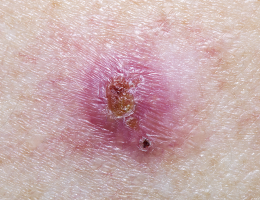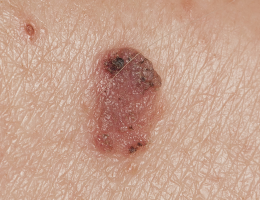Skin Cancer Facts
What You Should Know About Skin Cancer
What are the types of skin cancer?
Skin cancer is the most common cancer in the United States. There are many types of skin cancers, or skin carcinomas. The most common skin cancer types are:
The main cause of these skin cancers is UV rays from sunlight and tanning beds.
If you have been diagnosed with skin cancer, it is important to talk with your dermatologist to understand which type of skin cancer you have. The type of skin cancer you have will determine the type of treatment you get.
What do basal cell and squamous cell skin cancers look like?
Basal cell and squamous cell skin cancers are different from each other and look different on the skin. The good news is that both of them can be treated and, when spotted early, even cured.
Skin moles are confused with skin cancer often. Many people have moles on their skin. They are usually harmless. Sometimes moles are removed, but in a different way than how skin cancer is removed or treated.
Look at these images to know what to spot
Basal cell skin cancer

Squamous cell skin cancer

It is important that your dermatologist perform a skin check each year and that you do a skin self-exam once a month. Tell him or her when you notice a new or unusual spot or mole on your skin.
How are basal cell and squamous cell skin cancers treated?
Mohs surgery and Image-Guided SRT are 2 ways to treat basal cell and squamous cell skin cancers. Mohs surgery cuts out the skin cancer. Image-Guided SRT uses ultrasound images and X-rays to treat only the cancer and not harm the healthy skin.
There is also a traditional SRT treatment for these skin cancers. This treatment is different than Image-Guided SRT. It does not have or use ultrasound images. Without the ultrasound images to guide treatment, too much X-ray energy may be given. This can harm healthy skin cells. When you talk with your doctor about treatment options, be sure to ask him or her specifically about Image-Guided SRT.
Download the discussion guide for help talking with your dermatologist about the right skin cancer treatment for you.
Everyone Deserves a Surgery-Free Treatment Option
Participate in change. Do not let radiation oncologists limit your treatment options to protect their income. Sign a FREE petition to tell Medicare and health insurers that you expect them to CONTINUE COVERING an FDA-cleared, less invasive treatment option.